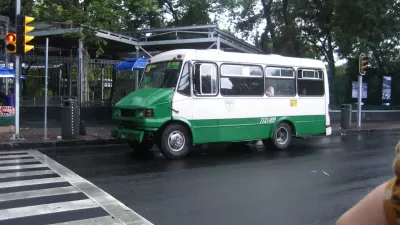Uber-style public transit gets people in urban and rural communities where they need to go in ways fixed-route buses can’t. But do the numbers pencil out?

On-demand, point-to-point ride programs in Missouri cities are receiving mixed reviews, reports Meg Cunningham of the Kansas City Beacon. This type of publicly funded service, also known as microtransit, has been touted as an alternative to fixed bus routes in Kansas City and St. Louis and a way to improve mobility in smaller cities and towns without public transportation.
Microtransit was initially launched in Missouri in response to declining bus ridership, exacerbated by the pandemic. Transit agencies cut routes and frequency, which resulted in even fewer riders. But people still need to get where they’re going, and within their budgets.
Funded by a combination of tax dollars and grants, public microtransit services hire private drivers in a similar fashion to ride-share services like Uber and Lyft. The original vision was to extend the reach of public transportation—for example, by connecting suburban riders to the nearest bus line—or providing affordable rides in service zones without frequent bus service.
While demand for microtransit is high and increasing, some locales are finding it’s not as cost-effective or efficient as a fixed-route bus system, Cunningham reports. “Kansas City’s microtransit program, IRIS, launched in March. On average, it costs the city about $29 a trip. Kansas City is seeing much of its demand for microtransit come from those traveling into the city from the Northland or Martin City. For the KCATA system as a whole, the cost per passenger in October was $1.88.”
As Missouri’s microtransit experiment continues, officials and advocates are still hopeful it can become a cost-effective way to meet a growing need, particularly in rural areas.
“Missouri has to think creatively about how to connect rural and urban communities,” Tyler Means, the chief mobility and strategy officer at the KCATA, told the Kansas City Beacon. Rural communities “are going to shrink and age, and they’re going to need more services in areas that have just kind of been forgotten about,” he said. “So they need solutions like this to allow them to gain access to the resources they need.”
FULL STORY: Missouri cities and rural towns look at Uber-style rides to replace buses. But can they?

Alabama: Trump Terminates Settlements for Black Communities Harmed By Raw Sewage
Trump deemed the landmark civil rights agreement “illegal DEI and environmental justice policy.”

Planetizen Federal Action Tracker
A weekly monitor of how Trump’s orders and actions are impacting planners and planning in America.

The 120 Year Old Tiny Home Villages That Sheltered San Francisco’s Earthquake Refugees
More than a century ago, San Francisco mobilized to house thousands of residents displaced by the 1906 earthquake. Could their strategy offer a model for the present?

In Both Crashes and Crime, Public Transportation is Far Safer than Driving
Contrary to popular assumptions, public transportation has far lower crash and crime rates than automobile travel. For safer communities, improve and encourage transit travel.

Report: Zoning Reforms Should Complement Nashville’s Ambitious Transit Plan
Without reform, restrictive zoning codes will limit the impact of the city’s planned transit expansion and could exclude some of the residents who depend on transit the most.

Judge Orders Release of Frozen IRA, IIJA Funding
The decision is a victory for environmental groups who charged that freezing funds for critical infrastructure and disaster response programs caused “real and irreparable harm” to communities.
Urban Design for Planners 1: Software Tools
This six-course series explores essential urban design concepts using open source software and equips planners with the tools they need to participate fully in the urban design process.
Planning for Universal Design
Learn the tools for implementing Universal Design in planning regulations.
Clanton & Associates, Inc.
Jessamine County Fiscal Court
Institute for Housing and Urban Development Studies (IHS)
City of Grandview
Harvard GSD Executive Education
Toledo-Lucas County Plan Commissions
Salt Lake City
NYU Wagner Graduate School of Public Service





























